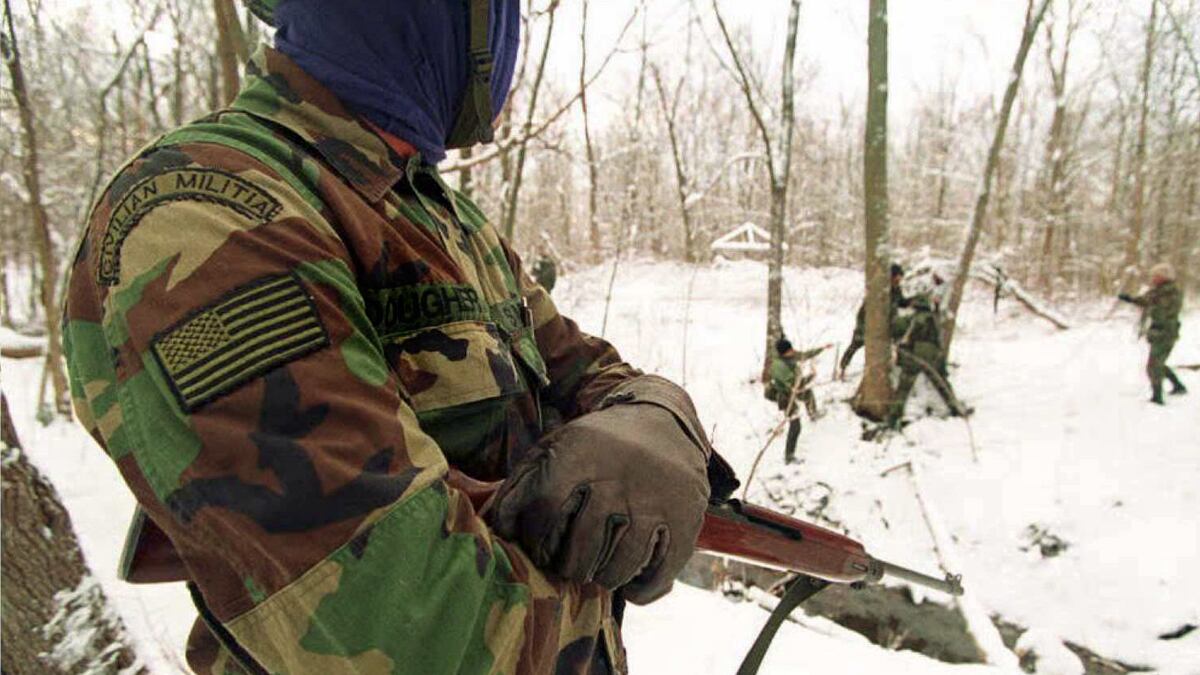On Monday, Pfc. Michael Burnett told a Georgia courtroom that last December he had watched as a fellow soldier shot a 17-year-old girl in the woods near their base, “checked [her] pulse and then shot her again.” He was pleading guilty to manslaughter related to his involvement in the deaths of a former soldier, Michael Roark, and his young girlfriend. But what was even more chilling than the cold-blooded murders was the fact that the killers—four, including Burnett, are being charged—are all not only on active duty in the U.S. Army, but members of a militia plotting to overthrow the U.S. government.

The size and strength of the group isn’t clear, but according to Burnett—who agreed to a plea deal in exchange for his testimony against others—the group, called FEAR, for Forever Enduring Always Ready, wanted to “give the government back to the people.” Prosecutors outlined active plots that included blowing up vehicles belonging to judicial and political leaders, as well as members of the Department of Homeland Security. They talked about bombing a fountain at a park in Savannah, Ga., and poisoning the apple crop in Washington state. Ultimately, they planned to assassinate the president.
Pvt. Isaac Aguigui was alleged by prosecutors to have been the ringleader, recruiting new members right off the base at Fort Stewart, in Georgia, and targeting those who were “in trouble or disillusioned.” The U.S. Army has denied there is a gang problem at its Fort Stewart base, and said its own investigation into the case remains open.
It wasn’t just the military that seemed not to have been aware of the group’s machinations. The Southern Poverty Law Center, which monitors militias, extremists, and supremacists all over the country, also was unfamiliar with it or any of its members. Nobody, in fact, seemed to have had any idea that such plotting was underway among U.S. soldiers at the Georgia base.
None of them, though, seem surprised at their own ignorance. Steven M. Chermak, a professor of criminal justice at Michigan State University who also directs the Extremist Crime Database, says that sifting through the huge number of militia-type groups to identify those that might pose a threat is like finding a needle in a haystack. And Mark Potok, a senior fellow at the SPLC, says the group appears to be so small that he doesn’t know how the center ever would have been able to identify it.
Daryl Johnson, a former analyst for the Department of Homeland Security who spent years researching domestic terrorism, probably was less surprised than anyone.
In 2009, Johnson authored a DHS report outlining how “[t]he economic downturn and the election of the first African American president present unique drivers for rightwing radicalization and recruitment.” It included a section about “disgruntled military veterans,” warning that they were an appealing group for extremists looking for recruits, in part because of their military training. “The willingness of a small percentage of military personnel to join extremist groups during the 1990s because they were disgruntled, disillusioned, or suffering from the psychological effects of war is being replicated today,” the report said, citing Timothy McVeigh, the veteran of Operation Desert Storm who killed 168 people in the 1995 Oklahoma City bombing, as an ominous example.
The report set off a firestorm on the right, with pundits calling it an attempt to smear or even criminalize right-wing free speech. Republicans in the House of Representatives called for Janet Napolitano to step down as head of the DHS. And House Majority Leader John Boehner said, “I just don’t understand how our government can look at the American people and say, ‘You’re all potential terrorist threats.’”
Eventually, Napolitano withdrew the memo and, Johnson says, later disbanded his unit, which studied domestic terrorism, neo-Nazis, and white supremacists. It’s a period that Johnson, who left the agency to start his own consulting company and has a book out next month called Right Wing Resurgence: How a Domestic Terrorist Threat Is Being Ignored, revisits with a heavy sigh. He says the report wasn’t prescient, but was the culmination of his 15 years of experience, and an outline of the “obvious thing that was going to happen.”
Critics of the report, he says, were playing with fire. “They took stuff out of context to try to gin up support for the Republican political platform,” he told The Daily Beast. “By criticizing the info given out, they made our country more vulnerable and less secure because they swelled the ranks of the extremist movement. There was already gasoline poured out because of the election and Obama, and they pretty much threw a match into it.”
Napolitano’s subsequent decision to pull the report legitimized that criticism, Johnson believes, which in turn only fueled the paranoia already rampant in extremist groups or those with extremist leanings. “Them not standing up for the report and trying to refute some of the mischaracterizations of the report has led to it becoming a recruitment tool for extremists.”
Asked whether he agrees with that assessment, Chermak jokes that he’d like to “sidestep” the question. He agrees, though, that there’s often some confusion when it comes to this area of research, with some perceiving the work as an attack on the right wing instead of on far-right extremists. “The precursor for us,” he says by way of clarification, “is that this individual is involved in a violent homicide.”
Chermak recently worked on a study that found that home-grown terrorists have perpetrated a higher number of attacks on American shores than international terrorists, but when it comes to casualties, it’s the reverse—largely because of the huge number of lives lost in the attacks of Sept. 11, 2001. In the years that followed, research was disproportionately focused on the international threat.
“With a limited pool of resources, you have to make some hard choices,” he says, noting that DHS is now backing his research on the domestic terror threat, and that some of the research conducted internationally is now being applied toward efforts here at home. “What radicalizes people towards violence ... there’s a lot we need to know about that still.”
Johnson and Potok say they believe there are certain troubling links between military service and participation in militia groups. For one thing the structure of most militias mirrors that of the military—with a strict hierarchy and system of rank and file. And combat skills are likewise at the heart of both organizations. “Militia movements,” Johnson says, “are also very nationalist and patriotic. There’s a reverence for the Bill of Rights and our founding fathers.”
It can make for what he calls an “easy transition.”
“Some justify it in their minds,” he says. “I’m about to retire; I should use my training and all my skills, and transition that into the civilian military, which is what some call a militia.” Plus, he adds, the ideological systems of many extremists groups can give people just the scapegoat they’re looking for in times of stress.
The 2009 report, he says, wouldn’t have prevented the recent attack on a Sikh temple in Milwaukee—also alleged to have been committed by a former serviceman—nor the existence of the group exposed in Georgia this week. But if it had been received, and handled, differently, he says, it might have persuaded law enforcement officials to reallocate resources to more closely monitor domestic threats. Groups like FEAR, which operate largely clandestinely, are hard to monitor without the use of undercover agents, and those operations can take a long time and cost a lot of money. “It comes at a cost, but it’s worth it,” Johnson says.
“It’s hard to admit that we have a problem in our own house,” he says. “It’s hard to admit that my brother or uncle or father is an extremist and potentially violent. It’s always easier to brush it off. But every terrorist has a family.”






